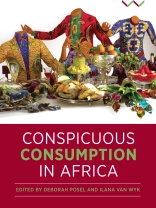From early department stores in Cape Town to gendered histories of sartorial success in urban Togo, contestations over expense accounts at an apartheid state enterprise, elite wealth and political corruption in Angola and Zambia, the role of popular religion in the political intransigence of Jacob Zuma, funerals of big men in Cameroon, youth cultures of consumption in Niger and South Africa, queer consumption in Cape Town, middle-class food consumption in Durban and the consumption of luxury handcrafted beads, this collection of essays explores the ways in which conspicuous consumption is foregrounded in various African contexts and historical moments. In 1899, Thorstein Veblen coined the phrase ‘conspicuous consumption’ to describe status-seeking in the obscenely unequal world of late-nineteenth century America. Many of the aspects he described in The Theory of the Leisure Class are still evident in our world today. While Veblen’s crude denunciation of material extravagance finds echoes in media exposés about the lifestyles of the rich worldwide, it is particularly recognisable in reporting on Africa. Here, images of conspicuous consumption have long circulated in local and global media as indictments of political corruption and signs of moral depravity. The essays in Conspicuous Consumption in Africa put Veblen’s concept under robust critical scrutiny, drawing on theorists like Mbembe, Guyer and Bayart by way of critique or addition. They delve into the pleasures, stresses and challenges of consuming in its religious, generational, gendered and racialised aspects, revealing conspicuous consumption as a layered set of practices, textures and relations. The authors resist the trap of easy moralisation, pointing to more complex ethical and political registers of analysis and judgement. This volume shows how central and revealing conspicuous consumption can be to fathoming the history of Africa’s projects of modernity, and their global lineages and legacies. In its grounded, up-close case studies, it is likely to feed into current public debates on the nature and future of African societies – South African society in particular.
Jadual kandungan
Acknowledgements List of Illustrations Chapter 1 Thinking with Veblen: Case Studies from Africa’s Past and Present – Deborah Posel and Ilana van Wyk Chapter 2 Changes in the Order of Things: Department Stores and the Making of Modern Cape Town – Deborah Posel Chapter 3 Conspicuously Public: Gendered Histories of Sartorial and Social Success in Urban Togo – Nina Sylvanus Chapter 4 Etienne Rousseau, Broedertwis and the Politics of Consumption within Afrikanerdom – Stephen Sparks Chapter 5 Recycling Consumption: Political Power and Elite Wealth in Angola – Claudia Gastrow Chapter 6 Chiluba’s Trunks: Consumption, Excess and the Body Politic in Zambia – Karen Tranberg Hansen Chapter 7 Jacob Zuma’s Shamelessness: Conspicuous Consumption, Politics and Religion – Ilana van Wyk Chapter 8 Precarious ‘Bigness’: A ‘Big Man’, his Women and his Funeral in Cameroon – Rogers Orock Chapter 9 Young Men of Leisure? Youth, Conspicuous Consumption and the Performativity of Dress in Niger – Adeline Masquelier Chapter 10 Booty on Fire: Looking at Izikhothane with Thorstein Veblen – Jabulani G Mnisi Chapter 11 Conspicuous Queer Consumption: Emulation and Honour in the Pink Map – Bradley Rink Chapter 12 The Politics and Moral Economy of Middle-Class Consumption in South Africa – Sophie Chevalier Chapter 13 Marigold Beads: Who Needs Diamonds?! – Joni Brenner and Pamila Gupta Contributors Index
Mengenai Pengarang
Stephen Sparks is a senior lecturer in the History Department at the University of Johannesburg.












